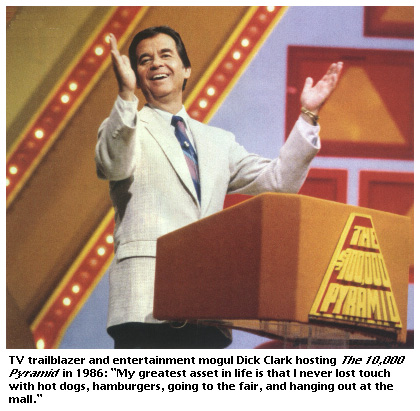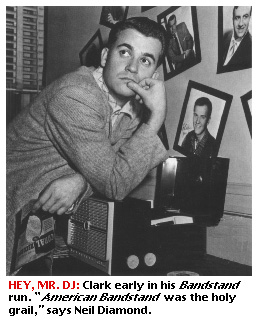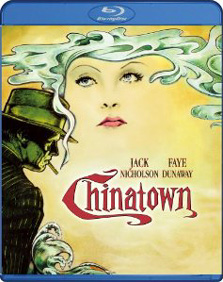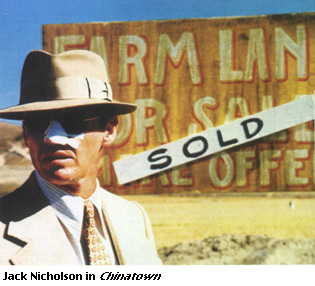![]()
| Dick Clark Remembers |
|
![]()
In memory of American pop culture icon Dick Clark (1929-2012),
Super Seventies RockSite presents his foreword to the 1981 book
"Dick Clark's The First 25 Years of Rock & Roll".

![]() t's difficult for me to realize that twenty-five years have passed since the days when the most frequently asked question I was called upon to answer was, "Do you really think 'this rock and roll stuff' will last?" Those of us who were around during that musical revolution had differing opinions of rock's lasting qualities. But I really did think that the form would last, and I said so.
t's difficult for me to realize that twenty-five years have passed since the days when the most frequently asked question I was called upon to answer was, "Do you really think 'this rock and roll stuff' will last?" Those of us who were around during that musical revolution had differing opinions of rock's lasting qualities. But I really did think that the form would last, and I said so.
The old-timers who reported on the music scene in the fifties were usually big-band buffs who honestly believed that rock was "bad" music and the "good" music of their day would return. By the way, that's one argument I've always sidestepped -- "good" versus "bad" music. There really is no such thing. "Good" is good to the people who enjoy it. "Bad" is bad to those who hate it for one reason or another. It became abundantly clear that rock was the music of the young and that it was looked upon by many older folks as "bad." Irving Berlin once said that popular music is popular because a lot of people like it. Obviously, a lot of people like rock and have made it an American institution. I've had my share of criticism because of my role in the development of rock and roll. I've also had my share of praise. But there's one comment of which I'm really proud: "Dick Clark was there when rock and roll needed him -- he helped keep it alive."
 Rock, however, wasn't the first art form to take a bum rap. "A wave of vulgar, filthy, and suggestive music has inundated the land. Our children are continually exposed to the monotonous attrition of this vulgarizing music." That's what critics said about the cakewalk in 1899! "A degenerated and demoralizing musical system has been turned loose to gnaw away the moral fiber of young people," said a prominent religious figure of swing in 1938. Frank Sinatra was categorized in 1943 as "the glorification of ignorance and musical illiteracy." According to Dr. Artur Rodzinski in 1944, "Boogie-woogie is the greatest cause of delinquency among American youth today."
Rock, however, wasn't the first art form to take a bum rap. "A wave of vulgar, filthy, and suggestive music has inundated the land. Our children are continually exposed to the monotonous attrition of this vulgarizing music." That's what critics said about the cakewalk in 1899! "A degenerated and demoralizing musical system has been turned loose to gnaw away the moral fiber of young people," said a prominent religious figure of swing in 1938. Frank Sinatra was categorized in 1943 as "the glorification of ignorance and musical illiteracy." According to Dr. Artur Rodzinski in 1944, "Boogie-woogie is the greatest cause of delinquency among American youth today."
By now I'm sure you've heard that rock is nothing short of harmful to your health and morals. But it has endured! In the first twenty-five years, rock's musical influences and styles have undergone several changes. There's not a single contemporary musician who hasn't been influenced by what started in the fifties. The musicians of the eighties often refer to the "roots" of their music. The Beatles were influenced by Chuck Berry, Buddy Holly, Elvis, and others. Elvis was influenced by black gospel and blues singers Arthur Crudup, Bo Diddley, and others. The big wheel just keeps on turning, and the music we still call rock sometimes bears little resemblance to its beginnings. But the influence is there, and maybe that's why the form has lasted. Unlike the giant (but often stagnant) trends of yesteryear, rock changes almost daily. Other forms of pop music were a little more boxed in, more restricted. That ability to adapt to whatever the public demands has kept rock thriving.
It's hard to conceive of rock becoming a musical dinosaur. Rock has the ability to find new feeding grounds, new sources of life. It can also change color to confuse predators. It has become an art-form survivor. Only one thing can bring down the giant -- the loss of creativity and inspiration through the computerization of business itself. It's becoming more and more difficult for new artists to break in because it's too expensive. If that prevails, I guess new independent record companies will challenge the multimillion-dollar, multinational corporate conglomerates with newer, riskier talent, as happened in the stone age of rock.
Nevertheless, the technological advances in recording, marketing, and distribution can only help rock flourish. To be able to hear your music from a grooveless, almost indestructible, computerized credit-card-type record or to have the option to see and/or hear your favorite artist at a cost comparable to today's album prices will provide rock with more staying power. That really makes me happy. It's the kind of secret (though perhaps juvenile) glow you get from being able to say to the cynics, detractors, and potential saboteurs, "I told you so!" ![]()
- excerpted from Dick Clark's The First 25 Years of Rock & Roll by Michael Uslan and Bruce Solomon, New York: Delacorte Press, 1981.

| Don't Forget, It's Chinatown |
|
![]()
Roman Polanski's timeless L.A. noir comes to Blu-ray at long last
by Chris Nashawaty in Entertainment Weekly


![]() s more and more Hollywood classics trickle onto Blu-ray, movie buffs have become obsessed with the back-catalog titles that are still missing. One that's always hovered near the top of any wish list is Chinatown (1974, R, 2 hrs., 10 mins.). Well, good news. It's finally here...and it looks amazing. Over the years, I've probably watched Roman Polanski's hard-boiled L.A. noir a dozen times. Each time I do, Robert Towne's flawless Oscar-winning detective story reveals unexpected layers of complexity and evil. It's one of those rare puzzle-box mysteries where, even if you can't work it all out, you trust that it all makes sense. And when you do finally solve it -- for me, around the fifth viewing -- it fills you with the giddy sense of accomplishment you get from polishing off a stubborn New York Times Sunday crossword.
s more and more Hollywood classics trickle onto Blu-ray, movie buffs have become obsessed with the back-catalog titles that are still missing. One that's always hovered near the top of any wish list is Chinatown (1974, R, 2 hrs., 10 mins.). Well, good news. It's finally here...and it looks amazing. Over the years, I've probably watched Roman Polanski's hard-boiled L.A. noir a dozen times. Each time I do, Robert Towne's flawless Oscar-winning detective story reveals unexpected layers of complexity and evil. It's one of those rare puzzle-box mysteries where, even if you can't work it all out, you trust that it all makes sense. And when you do finally solve it -- for me, around the fifth viewing -- it fills you with the giddy sense of accomplishment you get from polishing off a stubborn New York Times Sunday crossword.
If that makes the film sound like work, I don't mean it that way. It's a kinky, sinister kick, mainly due to Jack Nicholson's greatest performance ever. Having just finished The Last Detail, and with One Flew Over the Cuckoo's Nest on deck the following year, Nicholson was at the height of his '70s run. As L.A. cop-turned-private eye Jake Gittes, he's smooth, cocky, and also a bit slow on the uptake. Hired to investigate the fishy death of a water-department engineer, he seems to get everything wrong before realizing that he's being set up. What makes the movie such a wild ride is all of the wrong turns and blind alleys he's led down before he stumbles into an oedipal freak show. As with any memorable detective, his Achilles' heel is a woman. And not just any woman, but Faye Dunaway's sultry and secretive widow, Evelyn Mulwray -- the kind of smoky knockout who can't be trusted and who has been catnip to gumshoes like Sam Spade and Philip Marlowe for ages. Still, she's harmless compared with her creepy father, an amoral real estate mogul played by a deliciously depraved John Houston. Since Polanski is the man behind the camera orchestrating it all, the films iconic downbeat ending feels inevitable. It's also the kind of finale that no one could get away with today.
As for the extras, they're great -- especially a commentary crammed with anecdotes and backstory from Towne and Chinatown fanatic David Fincher -- but they're not new. I don't want to seem ungrateful, especially since I've been waiting for this Blu-ray for so long, but some fresh bonus goodies would have been welcome. Oh, well. To quote the film's famous last line: Forget it, Jake. It's Chinatown. A ![]()
![]() Reader's Comments
Reader's Comments
No comments so far, be the first to comment.
